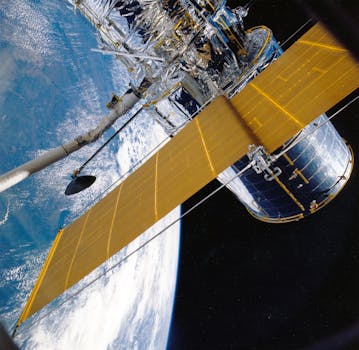
Future of Satellites: Revolutionizing Global Connectivity
The future of satellites is a rapidly evolving field, with advancements in space technology and increasing demand for global connectivity driving innovation and investment. As we look to the future, it is clear that satellites will play a vital role in shaping the way we communicate, navigate, and understand our planet.
Introduction to the Future of Satellites
Future of satellites is an exciting and rapidly evolving field, with new technologies and innovations emerging all the time. From the development of small satellites and satellite constellations, to the increasing use of satellites for Earth observation and communication, the industry is undergoing a period of significant transformation. As we look to the future, it is clear that satellites will play a vital role in shaping the way we communicate, navigate, and understand our planet.
Advancements in Space Technology
One of the key drivers of innovation in the satellite industry is the advancement of space technology. New materials, propulsion systems, and manufacturing techniques are making it possible to build smaller, more efficient, and more powerful satellites. For example, the development of 3D printing technology is allowing for the creation of complex satellite components, such as antennas and propulsion systems, with greater precision and speed. Additionally, the use of advanced materials, such as carbon fiber and nanomaterials, is enabling the creation of lighter and more durable satellites.
Increasing Demand for Global Connectivity
Another key driver of innovation in the satellite industry is the increasing demand for global connectivity. As the world becomes increasingly interconnected, there is a growing need for fast, reliable, and secure communication networks that can reach even the most remote and underserved communities. Satellites are playing a vital role in meeting this demand, with the development of new satellite constellations and communication systems that can provide high-speed internet access and other communication services to people around the world.
Applications of Satellites
Satellites have a wide range of applications, from navigation and communication, to Earth observation and space exploration. They are used by governments, businesses, and individuals around the world, and are an essential part of modern life. Some of the key applications of satellites include:
Navigation: Satellites are used to provide location information and navigation services, such as GPS and GLONASS. These systems use a network of satellites orbiting the Earth to provide precise location information and timing signals, which are used by a wide range of applications, from aviation and maritime navigation, to smartphone apps and wearable devices.
Communication: Satellites are used to provide communication services, such as television broadcasting, telephone services, and internet access. They are an essential part of modern communication networks, and are used by governments, businesses, and individuals around the world.
Earth Observation: Satellites are used to observe the Earth and provide information about the environment, climate, and natural resources. They are used by governments, businesses, and individuals to monitor the health of the planet, track changes in the environment, and manage natural resources.
Space Exploration: Satellites are used to explore space and conduct scientific research. They are an essential part of space missions, and are used to gather data, conduct experiments, and test new technologies.
Conclusion
In conclusion, the future of satellites is a rapidly evolving field, with advancements in space technology and increasing demand for global connectivity driving innovation and investment. As we look to the future, it is clear that satellites will play a vital role in shaping the way we communicate, navigate, and understand our planet. With their wide range of applications, from navigation and communication, to Earth observation and space exploration, satellites are an essential part of modern life, and will continue to play a vital role in shaping the future of our world.




